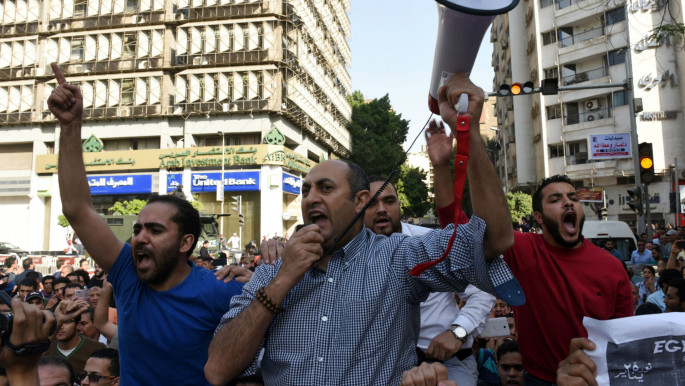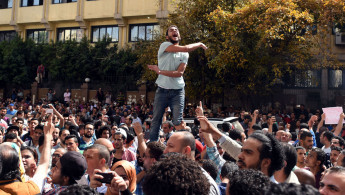The spirit of January 25 returns to Egypt's streets
Thousands of angry Egyptians rallied across the country on Friday to call for "the downfall of the regime", in the largest anti-government protests in two years, bringing back memories of the 2011 uprising that ousted longtime leader Hosni Mubarak.
The street protesters chanted the famous slogan of the Arab Spring, demanding the fall of the government, and cried out "leave, leave!" directed at general-turned-president Abdel Fattah al-Sisi for his decision last week to hand over two Red Sea islands to Saudi Arabia.
The first significant wave of street protests since Sisi became president in 2014, following a military coup against Egypt's first elected president Mohammad Morsi, however, were more than a nationalistic outburst of anger over what many felt was a humiliating territorial sell-off.
Many Egyptians have grown tired of what they see as Sisi's heavy-handedness, condescending speeches and failure to achieve any significant progress in the country, which has witnessed an alarming decline in human rights compounded by a tattered economy - the same issues that led to Mubarak's downfall.
 |
|
| Sisi's rule has seen an increase in discontent among Egyptians [Getty] |
The protests signal that Sisi no longer enjoys the broad public support that let him round up thousands of Islamists and left-wing activist after he seized power in 2013.
| In Pictures: Egyptians protest against Saudi island deal |
The police, unsurprisingly, responded to the unauthorised demonstrations, organised by secular activists, by firing tear gas into the crowds and chasing protesters down side streets to make arrests.
Security forces said they detained 119 protesters; however, monitoring groups said the number is higher.
 |
Authorities were quick to blame Morsi's banned Muslim Brotherhood for the protests, which bore little sign of an Islamist presence among the demonstrators. |  |
Blaming the Brotherhood
Authorities were quick to blame Morsi's banned Muslim Brotherhood for the protests, although they bore little sign of an Islamist presence among the demonstrators.
They said they had beefed up security to prevent "the infiltration of a terrorist group bent on causing chaos" - a thinly veiled reference to the Brotherhood, which has been labelled as a terrorist group and thousands of its members killed and imprisoned since the military takeover.
The protests are more likely a result of an accumulation of the Sisi regime's dismal human rights record and bad governance starting with the Rabaa massacre to the ongoing widespread killing and torturing of innocent people, including Italian Student Giulio Regeni who is just one example of this disturbing trend.
Sisi's 22-month rule has seen an increase in police brutality, corruption, unemployment and poverty to levels worse than under Mubarak rule while the country's schools, hospitals and other public bodies continue to crumble.
The pent-up frustrations of Egyptians also have finally boiled over towards their President's clumsy mishandling of a series of much reported international crises from the farcical investigation into the killing of Regeni, to the alleged bomb that brought down a Russian airliner over Sinai last year.
As the number of disgruntled Egyptians losing their patience with the regime grows, only time will tell if the protests, although relatively small in number in comparison to 2011 and 2013, will be the straw that breaks the back of the military regime.



